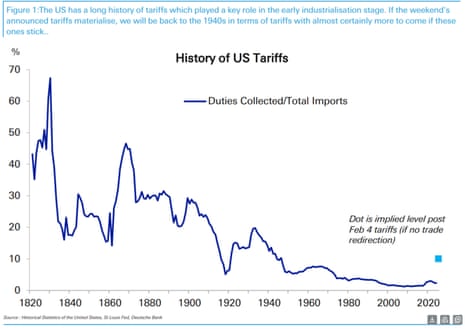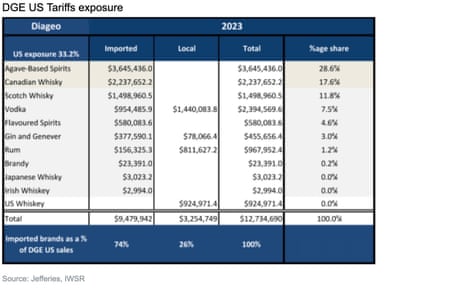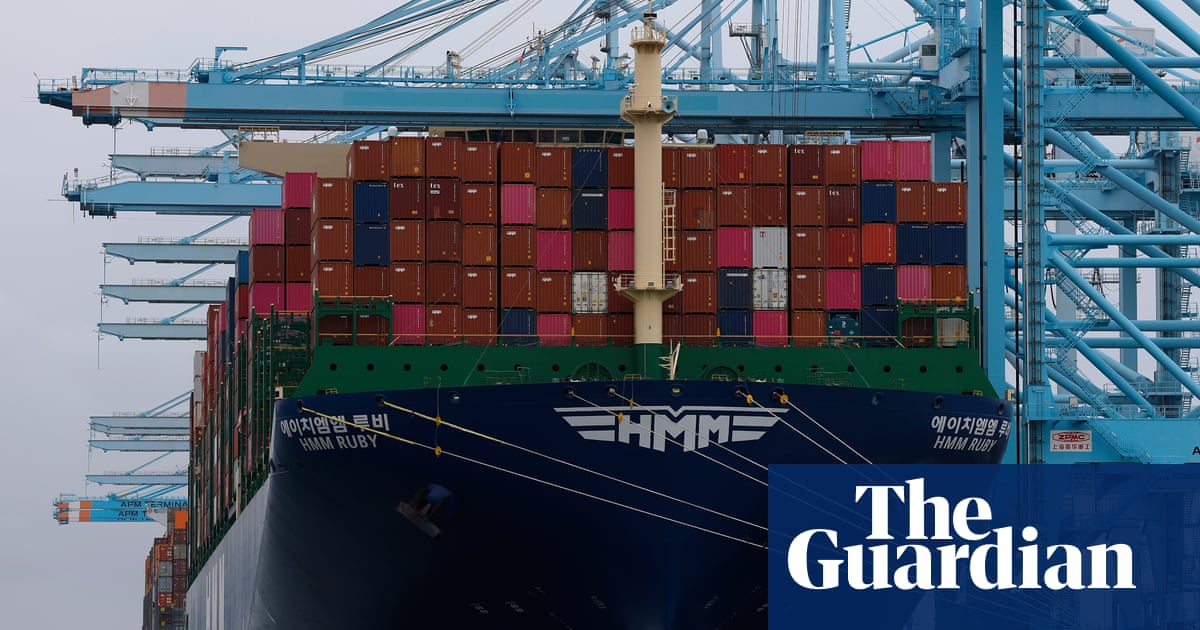Markets summmary
Time for a quick recap.
Stock markets across Europe have fallen, following losses in Asia-Pacific markets, after Donald Trump decided to impose new tariffs on Canada, Mexico and China last weekend.
News of the new trade levies, which kick in tomorrow, has sent shares sliding in London. The FTSE 100 share index is now down 1.3%, a drop of 115 points, which would be its biggest one-day drop since last October.
European markets are also deep in the red, with Germany’s DAX down 1.9%, France’s CAC off 1.8% and Spain’s IBEX down 1.5% in a “Trump tariff tantrum”.
Earlier, Japan’s Nikkei index fell by 2.6%.
Wall Street is expected to tumble when trading begins at 9.30am local time, or 2.30pm GMT.
The US dollar has surged since Trump announced 25% tariffs on Canadian and Mexican imports (with a 10% rate for Canadian oil), and a 10% rate for China.
This is pushing the euro closer to parity against the US dollar, and weakened the Canadian dollar to a 20-year low.
The oil price, though, has risen, on predictions of supply disruption.
Economists fear that the tariffs could push Canada and Mexico into recession later this year.
JP Morgan analysts have warned there is a risk that Trump’s policy mix is tilting into a business-unfriendly stance.
They told clients:
This weekend’s actions challenge our underlying view that the Trump administration will strive to limit disruptive policies as it balances its desire to reduce engagement with the world with a commitment to support US businesses.
In short, the risk is that the policy mix is tilting (perhaps unintentionally) into a business-unfriendly stance.
Deutsche Bank have calculated that US trade levies are heading to their highest levels since the 1940s.
BNP Paribas have warned that the new tariffs will be “an inflationary shock for the US”.
Key events Show key events only Please turn on JavaScript to use this feature
FTSE 100 on track for biggest fall since October
Britain’s FTSE 100 share index is on track for its worst one-day fall in almost four months.
Concerns about the tariffs announced against Canada, Mexico and China last night – and fears that Europe could be hit soon too – are weighing on stocks.
The FTSE 100 is currently down 111 points, or 1.3%, which would be its biggest one-day drop since 8th October last year.
Investors are shunning riskier assets due to fears of a full-blown trade war, says Matthew Ryan, head of market strategy at global financial services firm Ebury:
“The unveiling of some savage tariffs from the Trump administration over the weekend has wreaked havoc in financial markets.
“It is perhaps not the size of the trade levies that has caught markets wrong-footed, but both the hastiness at which they will be imposed and the speed of the retaliatory response from authorities in Canada and Mexico. We have on our hands a full-blown trade war and one that, worryingly, may have only just begun, with President Trump hinting that the EU will be next to feel the wrath of his tariff policies.
“There appears to be no economic rationale for these trade restrictions, and the big fear for investors is that these tariffs could act to significantly weaken global growth in 2025.
“This creates an extremely unpleasant environment for risk assets, and a favourable one for the dollar, particularly given the growing threat of higher Federal Reserve rates for longer.
Scottish Mortgage Investment Trust (-4.2%), which holds stakes in many US tech giants, is the top riser, followed by copper producer Antofagasta (-3.75%).
Diageo (-3.6%) is close behind, amid concerns that its sales into the US from Mexico and Canada will be hit by these new tariffs (see earlier post).
The jump in the oil price today (see earlier post) is expected to hit US airline stocks when Wall Street opens in just over two hour’s time.
American Airlines shares are down 2.2% in pre-market trading, Reuters flag, while United Airlines are 2.5% lower, and Alaska Air are off 2.1%.
The message from the White House with last weekend’s tariffs is that the US is ready to “take some pain’ to assert its dominance over other countries, says Gilles Moëc, group chief economist at AXA Investment Managers.
Moëc explains:
Those who had been hoping for a low “transformation rate” of Donald Trump’s electoral platform into policies may have to revisit their opinion after this weekend’s announcement of tariff hikes on Canada, Mexico, and China.
True, the move on Chinese products was limited to 10%, and Europe has so far been spared, but we think this is just a first salvo, and the shock on US import prices will already be substantial.
The message sent to all trade partners is that the US is ready to take some pain – the impact on US inflation is likely to be visible – to assert its dominance, and that no one, irrespective the tightness of the relationship with the US is, can consider themselves “safe” from US unilateral trade action.
Although the pound has fallen against the US dollar, it is gaining ground against the euro.
Sterling is up half a euro cent today at €1.201, its highest level in almost a month.
That highlights that the euro is among the currencies suffering more from trade war fears, even though the US has not – yet – announced tariffs on European imports (Donald Trump has hinted that this is coming, though….).
In contrast, the US president has also suggested that the UK might avoid new tariffs.
Deutsche Bank has calculated that if the tariffs announced by Donald Trump last weekend materialise, we will be back to levels last seen in the 1940s.

Strategist Jim Reid explains:
And this is before he has imposed tariffs on other nations with the “Sword of Damocles” especially hanging over the EU at the moment.
Mr. Trump has not been shy in admiration for former President McKinley (served 1897-1901) who he said made America “very rich through tariffs”.
If he ultimately wants to return to that era, we are still only about halfway back to the levels of tariffs that existed then.
JPMorgan says Trump administration may be ‘business unfriendly’
JP Morgan analysts are concerned that the policy mix of the Trump administration is tilting towards a “business-unfriendly stance”.
That questions one of the market’s core hopes over the Trump administration.
Following shock tariff announcements on Canada and Mexico, a team led by JPMorgan Chase’s chief economist Bruce Kasman warned that this weekend’s announcements point toward a materially different policy mix than had been built into their forecasts for 2025 and 2026.
They wrote:
“In short, the risk is that the policy mix is tilting (perhaps unintentionally) into a business-unfriendly stance.”
UPDATE: JP Morgan also told clients:
A trade conflict with the US’s closest economic partners has begun and all indications are that these actions are a start to a widening conflict.
And they warn that Canada and Mexico could both be pushed into recession by the trade war, if it lasts for six months or more:
Model estimates suggest that the size of a sustained 25% tariff hike will be large enough to throw the Mexican and Canadian economies into recession, and this outcome will be our inclination if these policies are maintained for six months.
The sectoral composition of North American trade highlights concentrated impact in the transportation, energy, capital goods, and industrial supply sectors. But the deep integration of the North American economy points to broad sectoral effects if the tariff hikes are sustained
The prices of corn, wheat and soybeans traded in Chicago have fallen today after US President Donald Trump imposed tariffs on Canada, Mexico and China.
Those tariffs have triggered fears of a broader trade war which could also impact agricultural commodities.
Reuters has the details:
Chicago Board of Trade most active corn fell 1.6% to $4.74-1/4 a bushel at 1031 GMT.
Wheat fell 1.0% to $5.53-3/4 a bushel, soybeans fell 0.7% to $10.34-3/4 a. bushel.
Dennis Voznesenski, analyst at Commonwealth Bank in Sydney, has explained:
“We are likely to see retaliatory tariffs on U.S. agriculture products which could distort trade flows.
Still, questions remain regarding how long the tariffs will. remain for and if exemptions for certain products will come on a. case-by-case basis.”
Markets are bracing for another volatile week as Trump’s tariff policies take centre stage, reports Daniela Sabin Hathorn, senior market analyst at Capital.com.
The confirmation of 25% tariffs on Mexico and Canada over the weekend caught markets somewhat off guard, despite Trump’s prior hints. The lack of a clear economic rationale behind this decision — justified primarily as a measure to curb illegal immigration and fentanyl imports — has unsettled investors, leading to a risk-off sentiment at the start of the week.
The initial market reaction has favoured safe-haven assets, with the US dollar, Japanese yen, and gold gaining momentum this morning. Equities, on the other hand, are struggling.
Tariffs weigh on corporate earnings by squeezing profit margins and slowing future growth. They also impact valuations by reducing the likelihood of a Federal Reserve rate cut. As a result, major US equity futures opened lower during the Asian session. This decline comes at a time when equities were already considered overextended and expensive, with confidence still shaken from last week’s DeepSeek meltdown. The introduction of tariffs has further dampened the outlook for equities.
Inflation across the eurozone has risen, adding to the economic pressures on the region even before a global trade war kicks off.
Prices across the euro area rose by 2.5% in the year to January, up from 2.4% in the year to December.
A jump in energy prices lifted inflation – energy inflation rose to 1.8%. from 0.1% in December.
Services prices rose by 3.9%, while food, alcohol & tobacco prices rose by 2.3%, and goods prices rose by 0.5%.
Economists had expected eurozone inflation to remain at 2.4%.
Kyle Chapman, FX markets analyst at Ballinger Group, says:
A 0.1% miss on estimates feels somewhat irrelevant while there is a trade war erupting in North America and the markets are bracing for Trump’s actions towards the EU, of course, and investors have taken the upside surprise in their stride.”
The tumble in the UK’s stock market today highlights the global damage that a trade war can cause.
Joshua Mahony, analyst at Scopemarkets, explains:
While Trump indicated that US-UK relations would remain largely unaltered, the losses seen throughout both the FTSE 100 and 250 highlight the perception that this trade war will hurt businesses across the globe irrespective of whether they are directly impacted by tariffs.
The consequences for global markets will come down to whether nations respond with a tit for tat levy on US goods rather than striking a deal that would seek to bring an end to this crisis. Nonetheless, today is a brutal reminder for investors that Trump’s pro-business approach may not necessarily always translate into market friendly announcements. Volatility is back and it’s here to stay.
US stock market heading for losses as trade war fears spook investors
Wall Street is still expected to drop sharply when trading begins, in over four hours time.
The Dow Jones industrial average is expected to drop by around 1%, while the tech-focused Nasdaq is down 1.8% in the futures market.
Russ Mould, investment director at AJ Bell, says:
“The prospect of a full-blown trade war has spooked investors as they weigh up the prospect of widespread retaliation by countries on the receiving end of Donald Trump’s tariff frenzy.”
“Affected countries aren’t going to take the hit lying down and a tit-for-tat scenario is now looking real. That could result in higher inflation and put a stop to further interest rate cuts for the time being – exactly the opposite of what equity investors want to happen.
“Higher prices could hurt demand, and there might be a trickle-down effect that knocks business and consumer confidence and feeds into weaker economic activity.
Oil price jumps
The price of oil has jumped this morning, as traders anticipate supply disruption due to the US tariffs announced last weekend, which include 10% on Canadian oil.
The price of a barrel of US crude oil has risen by 2% to $74 per barrel, while Brent crude – the international benchmark – is up 1.2% to $76.57.
Saxo’s strategy team say:
Oil prices surged, led by US WTI, after Trump imposed significant tariffs on various imports, including crude oil from Canada and Mexico, raising concerns about higher gasoline and diesel costs for US consumers.
But… demand for oil could suffer if a trade war hits global growth, weakening take-up of energy.
BNP Paribas: An inflationary shock for the US
The Markets 360 team at BNP Paribas have warned that the new tariffs will be “an inflationary shock for the US”.
They predict that US inflation will ‘rise sharply’ in the months ahead – due to the direct impact of tariffs being passed onto consumers, and ‘second round’ effects such as higher wages.
They told clients this morning:
-
The announcement of higher US trade tariffs confirms our core assumption that Donald Trump’s campaign promises should be taken literally and seriously.
-
In fact, the announced increase in tariffs were even larger and came faster than we had pencilled in.
-
In turn US consumer prices should rise sharply over the coming months, while tariffs should put the brakes on economic growth.
-
This cements the Fed’s ‘on hold’ stance, with the direction of the next move to be determined by the balance of growth, inflation and market reaction.
-
For the rest of the world, the increase in protectionism is a clear net negative for growth, not least because the risk of a tit-for-tat escalatory trade war has risen.
-
We continue to see a more ambiguous impact on inflation outside of the US, and thus the implication for other central banks will depend in large part on starting domestic economic conditions.
Drinks giant Diageo are among the top fallers in London, on concerns that it will be hurt by US tariffs on imports from Mexico and Canada.
Diageo’s shares are down 3.1%, a day ahead of a crucial half-year results presentation expected tomorrow.
Investment bank Jefferies have calcuated that 46.2% of Diageo’s US sales are imported from Mexico and Canada, including brands such as Crown Royal, Don Julio and Casamigos.

Diageo, as well as other European drinks makes such as Pernod, Campari and Remy, could alaso be hurt by potential higher tariffs of EU products into the US, Jefferies add.
Diageo’s chief executive, Debra Crew, knows the US market well having been president of the company’s North America region before becoming CEO in 2023.
Her tenure, though, has seen a shock profits warning, adverse global consumer trends and investor disquiet – as covered here.
Britain’s short-term borrowing costs have dropped to their lowest level in over three months this morning.
The yield, or interest rate, on two-year UK bonds has dropped to 4.17%, down from 4.21% on Friday night, and the lowest since the end of October.
That could be good news for borrowers, as two-year bond yields are used to price fixed-rate mortgages.
It suggests City traders are more confident that UK interest rates will fall this year, with three quarter-point cuts fully priced in.
Shares in some of the biggest European carmakers have slumped this morning.
Volkswagen, BMW, Porsche, Volvo Cars, Stellantis, and truckmaker Daimler Truck all fell between around 5% and 6%. French car parts supplier Valeo slid by 8%.

 3 months ago
54
3 months ago
54













































